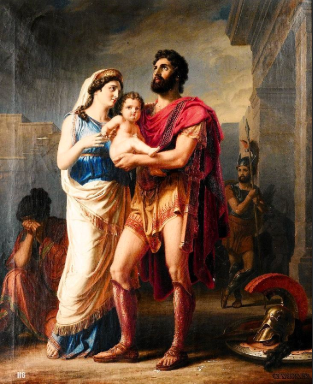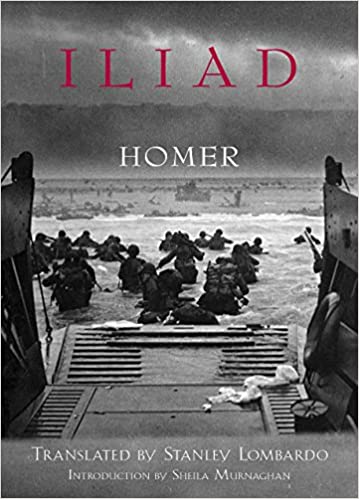GoodReads meta-data is 285 pages rated 3.85 by 310 litizens.
Genre: Mythology.
Verdict: The beginning and the end.
Life is a battle and life is a journey, it is often said. If so, then Homer covered it all. Ten years of battle followed by ten years of journey.
Manguel passes lightly over the caltrops that plague classrooms, was there anyone called Homer, did he live at the right time, were the texts written, could he have witnessed anything, was there a Troy,…? (We visited the site of Troy in 2015.) These obstacles often obstruct college readers. Well, I know they impeded my first readings, but Homer rises above the pygmies and prevails. While those controversies come and go with the tide of tenured controversialists, Homer endures.
The book charts the passage of the two books through European culture with the sure hand that Manguel always displays, and with some of the most compelling insights this reader has ever encountered in a lifetime of reading (about) these texts. The obvious comparison is the essayist Umberto Eco, who has become a showman, all form and no substance; in contrast, Manguel has both form and substance to spare.
For example, he lays bare the love stories within the Iliad, missed by those who see only a war story, that is, Achilles for slave girl Briseis, Patroclus for comrade in arms Achilles, Hector for wife Andromache and she for him, Priam for son Hector, and Paris for ineffable Helen. All of these are blotted out by the dark fate that brings them into collision. Love does not conquer all but is omnipresent. By the way, the only survivor in the foregoing list of lovers is Briseis.

When Hector and Andromache, he holding their young son, Astyanax, embrace Homer closes this scene of familial love by saying ‘the bright helmet lay at his feet.’ The fate it betokens is inescapable.
Yes, it is war, and there is killing, but as Manguel notes Homer describes the deaths of warriors individually and no two of them are the same. He gives to each of the fallen a name and a distinctive turn of phrase, more than sixty of them. There are no unknown soldiers here in mass graves. Each of them is a tragedy in which a noble spirit becomes a thing dragged in the dust. If it is a war story it is also the first anti-war story in its merciless detail.

Both Achilles and Odysseus tried to dodge the draft. Achilles hid among women while Odysseus feigned madness by plowing sand. But neither could escape fate. In the afterlife Achilles laments the fate that befell him, though he partly chose it, making it all the more bitter.
In his decade-long return Odysseus remained staunch to Penelope, giving way only to goddesses where he had no choice. The one mortal woman who came to him, he politely declined. Circe and Calypso he could not decline. (Try that one sometime with Mrs and see what happens.)
I liked the story of Alexander Pope’s rendering of the Iliad. Pope knew no Greek (and only some autodidact Latin) and thus did not work from a Greek text or an early Latin version, but rather compiled the existing English translations and synthesised them into a single text, and then edited it to get the right effects. While the result is thus not a translation from the Greek text, the emotional resonance is perfect.
While Manguel covers much he could not mention Madeline Miller’s beautiful novel Circe (2018) and I wish he could have done so. Perhaps in a second edition. What would he make of this splendid novel? Nor does he mention the drum-beat cadence of Christoper Logue’s War Music (2003), a translation of parts of the Iliad. Nor does he mention any of the audible versions now available, though he does note some of the public recitations that have become a fashion. I was tempted by one in Sydney last year until I realised that it was standing room only. That is, to say the audience was to stand for three three-hour sessions over three nights. Include me out.
Nor does he mention Homer’s contention that heroes need poets more than vice versa for without poets to tell the story and make it memorable no one would know what heroes have done. Poets can versify other things, if there are no heroes, but for heroes without poets there is only oblivion. I looked for the passage just now but could not find it readily. Perhaps a reader can lay eyes on it.

There is no discussion of the philology of the foundation text of either poem. Indeed, is there a foundation text somewhere in the world? I assume the Homeric texts came to Europe through Spain via Arabic translations, but have no confirmation for that assumption from these pages. Hold on, Wikipedia has it that the oldest complete, authentic text was middle Greek from the Tenth Century AD in Byzantium. It was the basis for Latin translations at the time, but has since itself been lost, either to a private collector, or – more likely – to destruction. A Latin translation might have been taken to Florence when the Medici’s offered a bounty for such treasures.
A title in a series concerning books that changed the world, I have read at least two others in this series. One was adequate and the other not, but this one rises well above the series as a stand alone title.

